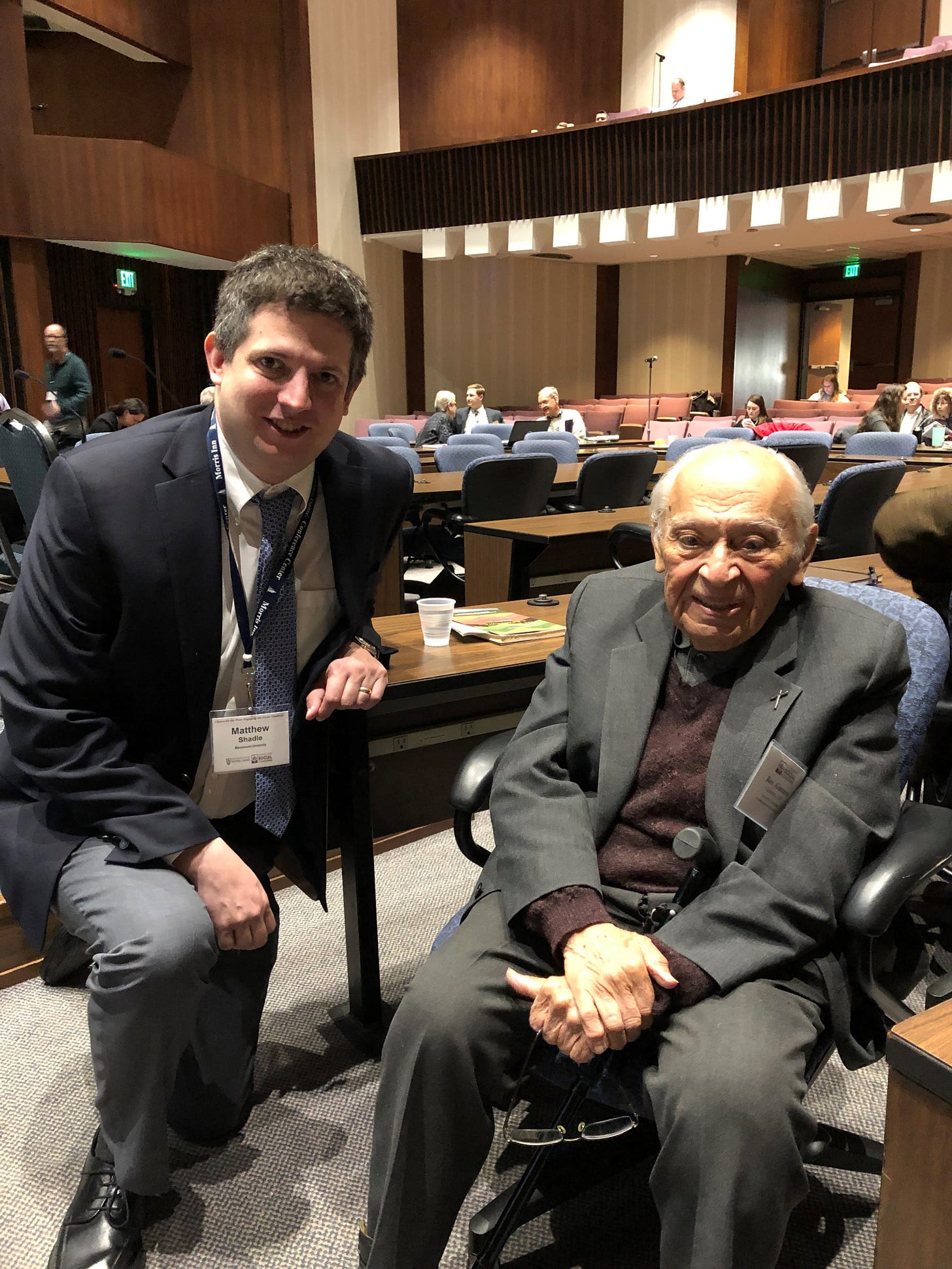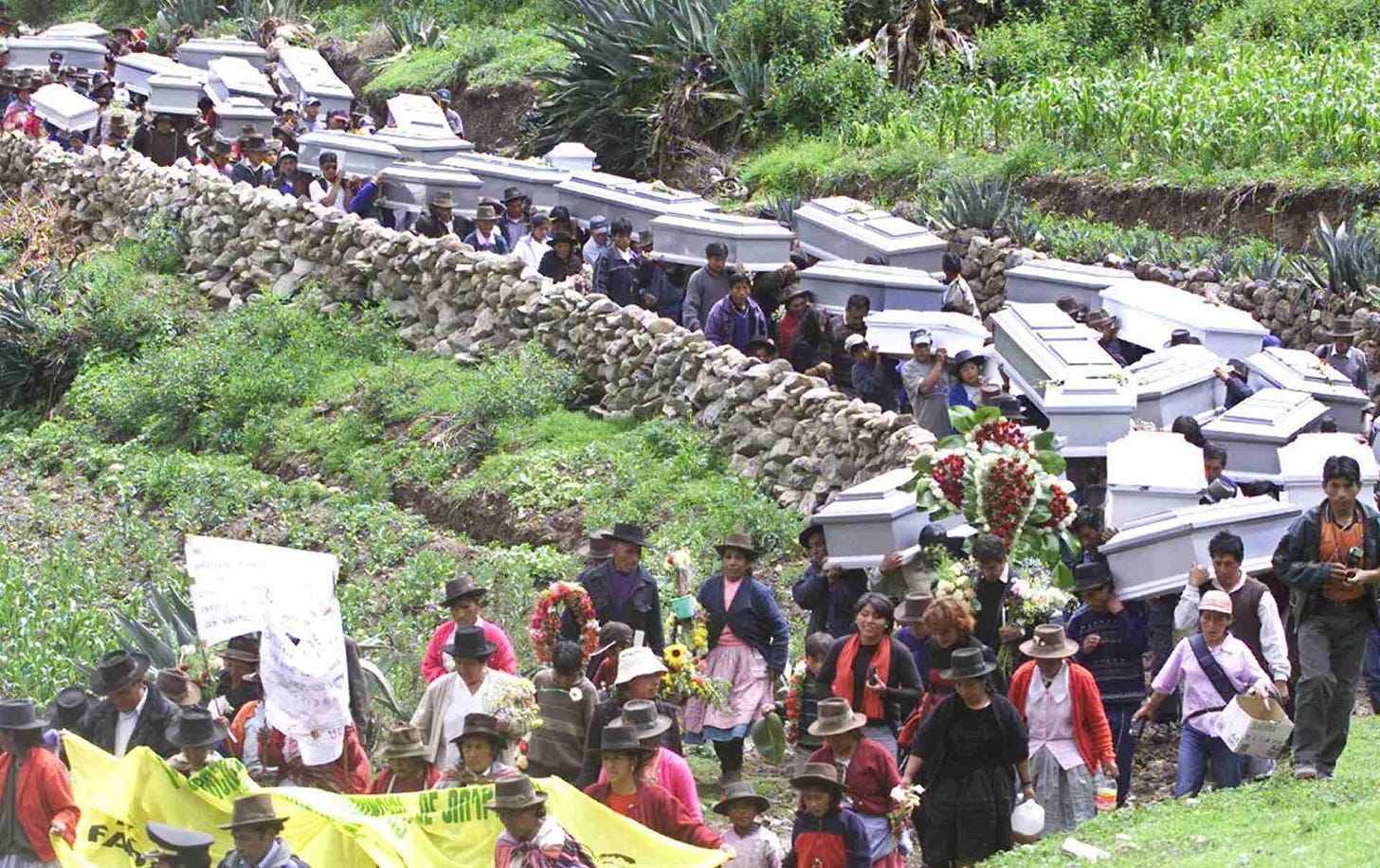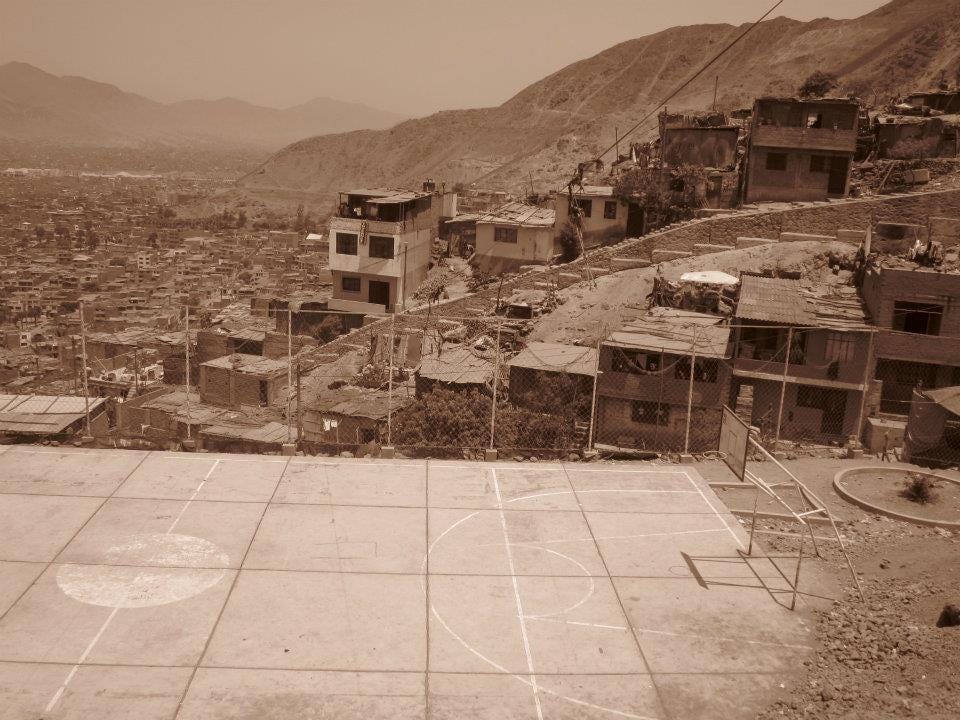Gustavo Gutiérrez as an Intellectual and Spiritual Companion
Commemorating the Legacy of a Theologian
Last week, I shared Leo Guardado’s excellent essay on the Peruvian theologian Gustavo Gutiérrez’s classic work A Theology of Liberation: History, Politics, and Salvation, commemorating the fiftieth anniversary of its publication in English. Theologian Michael Lee wrote a similarly insightful essay two years ago, on the anniversary of the initial publication of the book. Rather than write my own analysis of Gutiérrez’s work, I thought a good way to commemorate his legacy would be to share the story of my own intellectual and spiritual “friendship” with Gutiérrez, or in other words, how Gutiérrez has been a companion in my own intellectual and spiritual life.

I first encountered Gutiérrez’s work in 2001 or 2002 when I was just starting the master’s program in theology at the University of Dayton. The previous summer, I had spent some time volunteering in Honduras, working with impoverished children at a primary and secondary school, and Gutiérrez’s work helped me make sense of the Honduran people’s struggle for dignity and my own anguished feelings about how our lifestyle in the United States, and our government’s historical policies in the region, were tied in with that struggle. His theology also helped me to see that the Honduran people’s struggle, and my own struggle with my responsibility as a relatively affluent American, were, at least in part, spiritual struggles. The faculty at UD were kind enough to let me make a public presentation integrating my reading of Gutiérrez with my experiences as a volunteer in Honduras.
From there, my interest in Gutiérrez’s work, and liberation theology more generally, went in two directions. For one, I was troubled by one of the primary concerns raised in the Congregation for the Doctrine of the Faith’s 1984 Instruction on Certain Aspects of the “Theology of Liberation”, that at least some versions of liberation theology seem to reduce salvation or liberation to earthly liberation (i.e., economic and political liberation). As a student, I wondered if Gutiérrez’s theological language really referred to something properly distinct from economic, social, and political reality, or if it was a sort of “sacralization” of the secular. I remember pondering this on the long drive home to visit my parents in Arkansas over one of the breaks in the academic year and realizing that this was what I needed to write my master’s thesis on. My thesis tackled this problem by looking specifically at Gutiérrez’s understanding of the sacraments, particularly the Eucharist and the Church considered as a sacrament.
Of course, even in A Theology of Liberation, Gutiérrez developed an account of what he came to call “integral liberation,” the sense that socio-political liberation, psychological liberation, and salvation in the theological sense are intertwined even if distinct, an account he refined in later works in response to the CDF and other critics. Hence, grace is at work in the world to liberate the poor from oppressive conditions, but it also points towards an eschatological reality, the Kingdom of God. Likewise, sin can be manifest in the social structures that limit human flourishing, but at its heart sin is a spiritual reality, a turning away from God.
The main point of my thesis, however, was that the eschatological dimension of Gutiérrez’s theology of salvation was not fully integrated into his theology of the Eucharist. He speaks of the Eucharist, for example, as the sign or memorial of God’s liberating action in history, but what is missing is a sense of the Eucharist as Real Presence, as an encounter with the divine that certainly memorializes the divine presence in history but that also points toward the eschatological experience of union with the divine. Without fully realizing it, my concern was to explain how “Christian praxis,” centered in the sacraments but going out into the world, could be both meaningfully Christian and praxis.
As I was trying to work all of this out, I was also examining the economic and sociological analysis the first generation of liberation theologians had used to make sense of the experience of the poor in Latin America. I focused in particular on the use of dependency theory, an economic theory that proposed that the integration of poor nations into the global economy as exporters of natural resources and other raw materials is the source of their underdevelopment. As Gutiérrez himself noted in his book The Truth Shall Set You Free, dependency theory had become obsolete by the 1980s. The problem, however, as Ivan Petrella has skillfully shown in his The Future of Liberation Theology (2006), is that liberation theology depends on some form of socioeconomic analysis to give shape to the “historical project” of liberation, but by the 1980s, that analysis was mostly lacking. I was wrestling with all of this in these early days, but it would only bear fruit later.
While I was in graduate school, I met my now wife, Gisella, who coincidentally, like Gutiérrez, is from Peru. She likes to remind me that on our first date, I couldn’t stop talking about my master’s thesis, I guess because I assumed that, as a Peruvian, she would be impressed with what I had to say about Gutiérrez’s work. The reality is, however, that being married to a Peruvian has given me the opportunity to much more deeply appreciate the Peruvian historical and cultural context, and therefore to better understand Gutiérrez’s theology.
In 2010, when I was teaching at Loras College in Dubuque, Iowa, I had the opportunity to teach a January term class that traveled abroad to Peru, where we studied the history of Christianity in Latin America and the issues facing the contemporary Church in the region. We traveled to Peru because it is a relatively tourist-friendly country that offers a vivid microcosm of the Church’s history in Latin America, but also, of course, because Gisella could help the class connect with locals and guide us on our travels. In Peru, we visited historical sites, including colonial churches and monasteries, but we also met with the late Jeff Klaiber, S.J., a church historian focusing on the Church’s relationship with dictatorships and democratic governments in the second half of the 20th century, the head of the episcopal conference’s social action office, a pastor leading a parish in a poor neighborhood not far from where Gutiérrez had ministered, and a center focused on outreach to the peoples of the Amazon region. We also visited a museum exhibit that documented the civil conflict involving the brutal Shining Path guerrilla movement whose “people’s war” began in the early 1980s and the authoritarian government of Alberto Fujimori, first elected in 1990.
While there, we were also hosted by the Instituto Bartolomé de las Casas, an organization originally established by Gutiérrez to train leaders in the principles of liberation theology and prepare them for community organizing, but also as a documentation center and publisher. It currently focuses on issues like democracy building and environmental sustainability. The IBC primarily offers courses for locals and weeks-long courses for international visitors, but when I contacted them out of the blue, they were kind enough to improvise a one-day course for our students, including an introduction to liberation theology and a visit to a parish in one of Lima’s poorest neighborhoods, Villa El Salvador. We were also able to tour the IBC facilities, including the library which had grown out of Gutiérrez’s personal collection of books and journals. We returned to Peru two more times, in 2012 and 2014, and visited the IBC each time.
In my own theological research, I had turned to the question of the origins of war, the topic of my dissertation and later my first book, The Origins of War: A Catholic Approach (Georgetown, 2011). Still driven by the insight that grace and sin are woven into social and political reality, I wanted to explore how theology, in dialogue with other disciplines, could help us understand the origins of violent conflict.
In an article published in the journal Political Theology, I drew on insights from my book to try and shed light on the conflict between the Shining Path and the Peruvian government in the 1980s and 1990s. Drawing on Gutiérrez’s account of integral liberation, I tried to show how socioeconomic factors like changes in the agricultural sector, political factors like the instability of Peru’s democratic institutions, and cultural factors like disdain for the indigenous majority among the white and mestizo population in Lima contributed to the conflict, but that these factors likewise contributed to patterns that could be analyzed and interpreted through a theological and scriptural lens. The article closes with the suggestion that the Church’s practices during the conflict, such as building solidarity in communities impacted by violence, advocating for human rights, and participating in the Truth and Reconciliation process in the conflict’s aftermath were embodiments of grace that offered resistance to the violence of both the Shining Path and the Fujimori government.

More recently, I have returned to the question of the economic analysis used by liberation theologians to give flesh to their “historical project.” In my book Interrupting Capitalism: Catholic Social Thought and the Economy (Oxford, 2018), I offer a history of how 20th and 21st-century Catholics have thought about, and participated in, the economy. Two of the chapters focus on the work of two liberation theologians: Gutiérrez and the Spanish/Salvadoran Jesuit Ignacio Ellacuría.
The first of the two chapters provides an overview of their theological projects, focusing on their understanding of liberation or salvation in history and the Church’s role in the world. I also explore how they understand the process of secularization and what that process means for the Church’s relationship to the world. I am still wrestling with the same question as I did in my master’s thesis: How can we engage with the world in a way that both respects secularity but that is truly Christian?
It’s in the second of the two chapters that I turn to the economic and social analysis used by Latin American liberation theologians. This was definitely the most difficult chapter in the entire book to write. Liberation theology has most frequently been criticized for its use of Marxist analysis. Unlike most critics, I try to give a historically sensitive account of why liberation theologians turned to Marxist analysis, but I ultimately propose critical realism (see here for a primer on critical realism from a theological lens) as a corrective for some of the problems that arise from a Marxist perspective. Gutiérrez himself had grown out of Marxist categories by the 1980s, if not earlier, and eventually adopted a position I think is compatible with critical realism.
When it comes to dependency theory, interpreters have long distinguished between a more moderate version of the theory and a more radical, Marxist-inspired variant (although departing from orthodox Marxism in important ways). The more I immersed myself in the issue, I concluded that moderate dependency theorists, like the Brazilian economist Celso Furtado, had essentially correctly diagnosed the economic situation in Latin America in the late 1960s (or at least more correctly diagnosed it than the advocates of competing theories), but that increasing political polarization between the radical left and the authoritarian right blocked any possibility of implementing the policies recommended by these moderate dependency theorists. Of course, I’m neither an economist nor a historian, and so the more important insight for me was regarding how liberation theology had both contributed to this course of events and been shaped by it.
I continue to draw on Gutiérrez’s work (and likewise Ellacuría) as a reference point for my work in theology and ethics. For example, in 2019 I presented at the University of Notre Dame on how we might draw on the option for the poor, first proposed by Latin American liberation theologians like Gutiérrez, to think about digital privacy and other ethical issues arising from digital technology, a project I am continuing to expand on.
Even though I have only briefly met him once, I hope it’s clear that Gustavo Gutiérrez is a kind of intellectual and spiritual friend for me, a companion as I wrestle with trying to make sense of how to live out the Christian life in an authentic and intellectually rigorous way. I think telling the story of that friendship is one fitting way to commemorate the legacy of a great theologian and inspiration for the Church.






Thanks for posting this marvelous reflection on your own journey with Gutierrez and his ideas. I look forward to more!